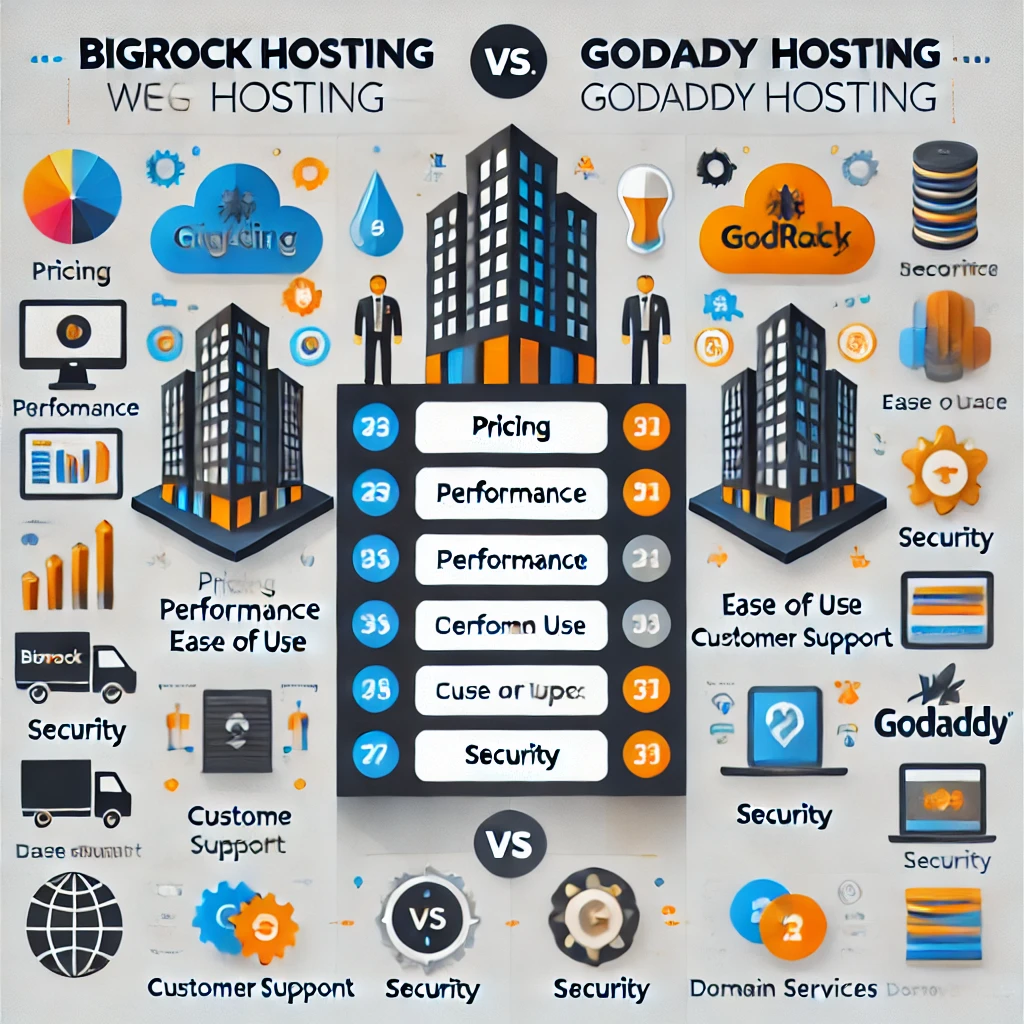When it comes to hosting your website, choosing the right provider is crucial for your site’s performance, reliability, and scalability. BigRock and GoDaddy are two of the most popular hosting providers, each offering a range of services tailored to different needs. In this article, we’ll compare the two to help you decide which one is better for your specific requirements.

1. Pricing and Plans
BigRock:
- BigRock offers affordable hosting plans, especially for shared hosting.
- Plans start as low as INR 99/month, making it an attractive option for beginners and small businesses.
- Discounts are available for long-term subscriptions, and it often includes freebies like email hosting.
GoDaddy:
- GoDaddy’s hosting plans start slightly higher but offer more features even in basic plans.
- Pricing starts at around INR 179/month for shared hosting.
- Frequent promotions and bundle deals make it competitive.
Winner: BigRock for budget-conscious users, while GoDaddy offers better value for feature-rich plans.
2. Performance and Uptime
BigRock:
- BigRock promises a 99.9% uptime guarantee, but real-world uptime may sometimes fall short.
- Performance is decent for low to medium traffic websites.
GoDaddy:
- GoDaddy also guarantees 99.9% uptime but consistently delivers robust performance.
- Faster loading speeds, especially for WordPress sites.
Winner: GoDaddy for better consistency in uptime and speed.
3. Ease of Use
BigRock:
- User-friendly cPanel interface.
- Suitable for beginners with clear instructions and a simple setup process.
GoDaddy:
- Offers a custom dashboard along with cPanel.
- Additional features like 1-click installations for over 150 apps, including WordPress.
- Beginner-friendly with an intuitive user interface.
Winner: GoDaddy for a more polished and feature-rich experience.
4. Customer Support
BigRock:
- Provides 24/7 customer support via live chat, email, and phone.
- Response times can sometimes be slower.
GoDaddy:
- Offers 24/7 support through live chat, email, and phone.
- Faster response times and more knowledgeable support staff.
Winner: GoDaddy for quicker and more efficient customer support.
5. Security Features
BigRock:
- Includes basic security features like SSL certificates and DDoS protection.
- Malware scanning is an add-on.
GoDaddy:
- Provides advanced security features, including free SSL certificates for the first year, malware scanning, and backups.
- Premium security tools are available for an additional fee.
Winner: GoDaddy for more comprehensive security options.
6. Scalability and Advanced Features
BigRock:
- Limited scalability options compared to GoDaddy.
- Suitable for small to medium-sized websites.
GoDaddy:
- Offers a wide range of hosting types, including shared, VPS, and dedicated servers.
- Advanced features like managed WordPress hosting and business hosting.
Winner: GoDaddy for greater scalability and advanced hosting options.
7. Domain and Email Services
BigRock:
- BigRock is well-known for its domain registration services and often bundles domain names with hosting plans.
- Email hosting is included in most plans.
GoDaddy:
- Also offers domain registration and hosting bundles.
- Professional email hosting is available with Office 365 integration.
Winner: Tie, as both offer excellent domain and email services.
Final Verdict
The choice between BigRock and GoDaddy depends on your specific needs:
- Choose BigRock if you are on a tight budget or need a simple hosting solution for a small website.
- Choose GoDaddy if you prioritize performance, scalability, and advanced features for a growing website.
Overall, GoDaddy edges out as the better option for most users due to its consistent performance, user-friendly tools, and extensive features. However, BigRock is a solid choice for those looking for cost-effective hosting with basic features.